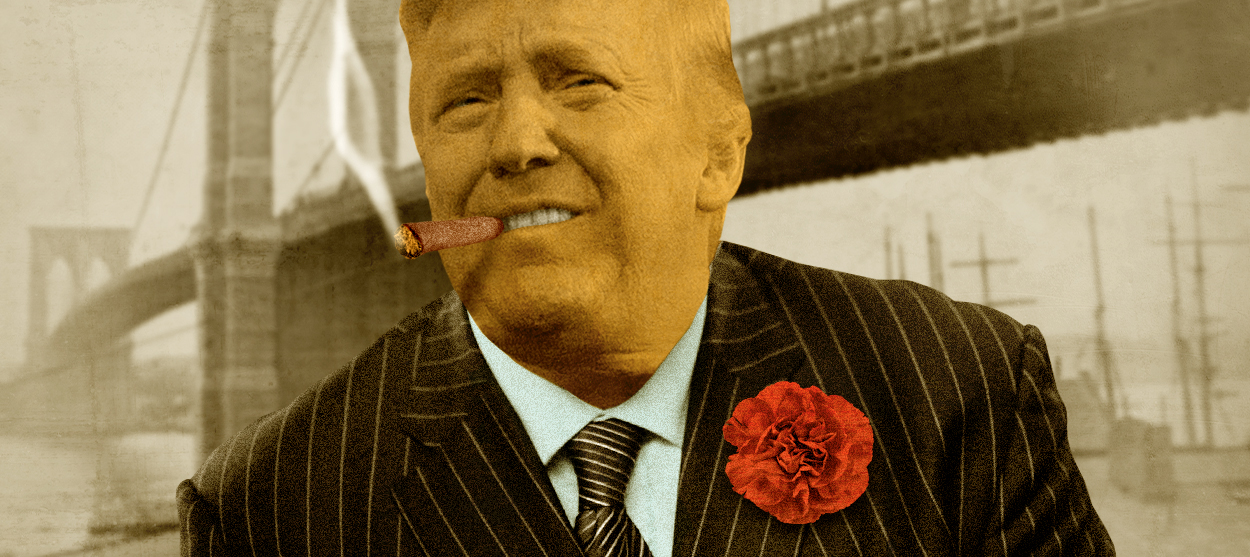Trump tried to act like a mob boss. Instead he's just a thug.
He's no Don Corleone


A free daily email with the biggest news stories of the day – and the best features from TheWeek.com
You are now subscribed
Your newsletter sign-up was successful
Throughout the final, tortured moments of the 2020 presidential campaign, Donald Trump took to referring to his rival, Joe Biden, as the head of "the Biden crime family." But as psychologist Mary L. Trump, the soon-to-be-erstwhile commander-in-chief's niece, and author of Too Much and Never Enough, has suggested, some of Trump's statements are, in fact, projections of his own behavior. Indeed, Trump's alpha male posturing and affected bravado — which he used to foment a personal brand of being a savvy businessman and a mover-and-shaker blessed with raw cunning — is bound up in the mythos of the mobster as portrayed in pop culture, film, and TV. However, the realities that seep through that mythos, like blood on carpet, demonstrate why Trump is leaving the White House at a record low in approval. Trump may have tried to affect the steely suaveness of the hyper-competent crime boss, but he failed because, in fact, he's a blundering thug.
The grand figure of the gangster mythos is Marlon Brando's tuxedoed Vito Corleone, brows furrowed with the pain of being such an intense strategic and tactical genius, speaking with an eloquent pathos about loyalty. His famous-to-the-point-of-parody offer to get what he wants by making his rival "an offer he can't refuse" has its sleazier echo in Trump's self-described "perfect" phone calls to Volodymyr Zelensky, the president of Ukraine, asking him to "do me a favor, though" by launching a fake investigation into Joe Biden, and in his post-election conversation with Brad Raffensperger, the Georgia Secretary of State, in which he said, "I only need 11,000 votes … Give me a break … Or we can keep it going, but that's not fair to the voters of Georgia because they're going to see what happened."
It turned out that these men — and 81,283,485 voters — could very much refuse Trump's offers.
The Week
Escape your echo chamber. Get the facts behind the news, plus analysis from multiple perspectives.

Sign up for The Week's Free Newsletters
From our morning news briefing to a weekly Good News Newsletter, get the best of The Week delivered directly to your inbox.
From our morning news briefing to a weekly Good News Newsletter, get the best of The Week delivered directly to your inbox.
Trump's inability to muscle his way to victory is a testament to how the pop culture perception of the all-powerful kingpin collides with the more finite realities of wheeling and dealing in real life. "He knows how to perform [the role of a gangster], with the bullying and aggression," says Joe Loya, critically acclaimed author of The Man Who Outgrew His Prison Cell, podcaster of Bank Robber Diaries, and former bank robber. "He kept trying to do the thing that mobsters do where they don't say the thing [they're asking for]. Finally, he realizes nothing he's saying is sticking, so he comes out and says it. He's a buffoon."
To Loya, this highly performative aspect of Trump's persona — the part that will make a show of firing people on TV or by tweet, but kowtows to men like Vladimir Putin — is why he fails to achieve the mettle of a successful gangster, or world leader: "If this guy walked down the prison tier, everyone would recognize him as puffery."
Trump is no Don Corleone. But Loya does see similarities between Trump and the more bullish scion of the Corleone family, Sonny, "who rose to the top, ran the family, but only for a moment because he was undone by his hubris. There's this hubris among certain people that ensures the most glorious moments of their entire lives are tied to their doom."
Trump's own pride may be his ultimate undoing. His refusal to believe that he could have been honestly defeated in the 2020 election nurtured an uprising at the Capitol that prompted a historic second impeachment. The fetid potpourri of likely forthcoming charges, indictments, and civil suits will bring financial and legal perils when he leaves office. His personal brand is now so tarnished that organizations ranging from his bank lenders to the PGA want nothing to do with him. His hubris has its echoes in Sonny, but also in Fredo Corleone, whose sense of entitlement as the "stepped over" son leads him to betray the family — and, eventually, to disgrace and a watery grave. Loya opines that "Trump's glory is that he made it to the presidency, and it walks hand in hand with his doom."
A free daily email with the biggest news stories of the day – and the best features from TheWeek.com
One wonders if taking a remotely humane approach to the coronavirus pandemic, as opposed to blustering racist incentive about the "China Virus" and publicly belittling Dr. Anthony Fauci, or showing empathy to the widows of fallen soldiers and people displaced by hurricanes, or simply not mocking Biden for his compassion toward his only surviving son, might have given Trump an advantage in the election. After all, Vito Corleone first amasses his influence in the neighborhoods of Little Italy, influence that will form the pillars of his empire, by taking care of his community: In Godfather II, young Vito tries to persuade (via a substantial sum of money) a landlord to rescind the eviction of a widow who can't bear to give up her son's beloved dog — when he can't, Vito doesn't overtly threaten or bully the landlord, he simply suggests he talk to people in the neighborhood. After getting a clear sense of who he's dealing with, the landlord allows to the widow and her dog to stay, at a reduced rent.
Yet this was clearly not a lesson Trump and Co. internalized (Steve Bannon's talk of "going to the mattresses" aside). The part of the mafia mythos that most appeals to Trump and his supporters is "the notion that nothing is more important than respect and loyalty to The Boss, above all else, including anything like, say, laws," explains Tod Goldberg, bestselling author of Gangsterland, Gangster Nation, and The Low Desert: Gangster Stories. This mentality of "one nation, under the Don" has Trump preparing to issue around 100 pardons and commutations — including "controversial ones secured or doled out to political allies … that he could benefit from post presidency."
The problem, Goldberg says, "is that if they ever watched those films and TV shows beyond the first act or pilot, they'd know that someone always snitches. Plus, the organization is peopled by narcissistic sociopaths."
In real-life, Trump himself could be considered the ultimate snitch, sharing state secrets with our foes, mouthing off with details about criminal conspiracies in interviews with Lester Holt, and live-tweeting his way to a second impeachment. "He talks too much," says Loya, bluntly. "If he was a gangster and he came to prison … and they saw the way he talked to the Russians … they'd see this guy … as operating from a position of weakness. If he came to prison as a gangster, and not as a president, he'd have holes put in him."
Greg Olear, a political columnist and the author of Dirty Rubles: An Introduction to Trump/Russia, has done extensive research into Trump's real-life underworld connections, and how they emboldened him as the gangster-in-chief. "Donald Trump is a second-generation mob money launderer. His father, Fred Trump, was the same generation as Meyer Lansky, who invented money laundering," Olear says. "While Trump has been mob his whole life, he's not a mobster or a mob boss, as we understand it. He's a front man." He likens Trump to a character in the Sopranos canon — a character whose recklessness and desperation obliterates his life: "The closest figure to Trump in mafia films is Davey Scatino, the gambling addict who gets in debt to Tony Soprano, and winds up overleveraging his business, Ramsey Outdoor, to pay him back."
Despite the carefully curated Hollywood image of a La Cosa Nostra led by men who brood artfully over the nature of family and vengeance, in reality, the mob is often populated by guys who live by the dull sparks of their baser instincts. "The best mob movie to look at, if you hope to understand Trump and his time in office, is Donnie Brasco," says Goldberg. "It's a cat and mouse between the mafia and the FBI, but it's also about feckless mobsters who don't realize they're dinosaurs walking around the day before the asteroid hits, that society has moved beyond them, along with technology, and that quaint notions like omerta don't hold much sway anymore … the crimes perpetrated in Donnie Brasco are so brazen and stupid, one can only ask, 'Did they really think they'd get away with that?'"
The image of the masterful schemer — Michael Corleone orchestrating the synchronized murders of his foes; Jimmy Conway plotting the Lufthansa heist; or Tony Soprano becoming the boss of New Jersey — turned the gangster into one of pop culture's enduring outlaws, but it meets with a blunter reality. On-screen mafiosos have their moments of humanity, like Vito Corleone holding his infant son on his lap, saying, "Michael, your father loves you very much." Or Jimmy Conway weeping over the murder of his friend, Tommy. Or, most famously, Tony Soprano's protective tenderness over his ducklings. In reality, mob bosses are hideous, narcissistic, and cruel. "I don't think Trump took his cues from mob movies as much as he took them from actual mobsters," explains Goldberg, "The way he dresses, his hair, his morbid sense of humor, his total lack of shame and empathy, the way he treats women like chew toys — it's hard to write a character like that, because he becomes so intensely unsympathetic that the audience just pities him."
Laura Bogart is a featured writer for Salon and a regular contributor to DAME magazine. Her work has appeared in The Atlantic, CityLab, The Guardian, SPIN, Complex, IndieWire, GOOD, and Refinery29, among other publications. Her first novel, Don't You Know That I Love You?, is forthcoming from Dzanc.
